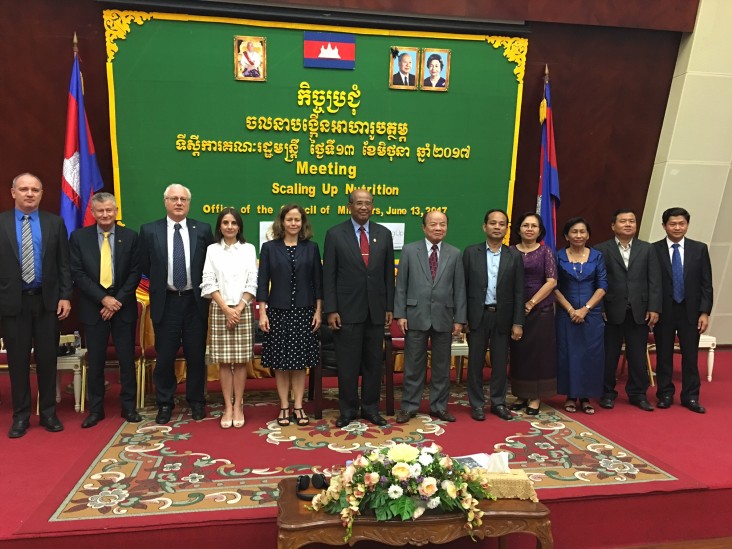
(as prepared for delivery)
- Your Excellency, Yim Chhay Ly, Deputy Prime Minister and Chairman of the Council for Agricultural and Rural Development
- Your Excellency, Ngy Chanphal, Secretary of State of the Ministry of Interior and Vice Chairman of the Council for Agricultural and Rural Development
- Your Excellency Sok Silo, Deputy Secretary General of the Council for Agricultural and Rural Development and Government SUN Movement Focal Person in Cambodia
- Mr. Keith Porter, Helen Keller International Country Director and Civil Society Organization SUN Movement Focal Person in Cambodia
- Ms. Debora Comini, UNICEF Representative and United Nations SUN Movement Focal Person in Cambodia
- Distinguished guests, ladies and gentlemen.
It is a true pleasure to attend my first Scaling Up Nutrition, SUN, Annual Meeting in Cambodia, and it is an honor to speak on behalf of donor partners. Today, I would like to make four points.
First, when we talk about nutrition, we usually highlight alarming numbers and note disturbing trends. One of the most powerful examples I use for Cambodia is that one out of every three children under five is stunted. Last night, I was reviewing some nutrition notes at home, and when I read this statistic, I thought of my three wonderful daughters, who were playing around me, and I reflected that one would likely have been stunted if circumstances were different and I was a mother in Cambodia. My point is that we, as policy makers and development partners, are also grandparents, parents, brothers, sisters, aunts, uncles, and cousins , we should not forget that these numbers link to real people and that combating malnutrition and overnutrition, which is a growing issue in Cambodia, requires our continued joint action and commitment on behalf of precisely those people.
Second, we must continue to push for increased spending across Ministries on nutrition. It was encouraging to see that the Ministry of Health included nutrition for the first time in the national budget for its Third Strategic Health Plan last year. It is also heartening that the Ministry of Agriculture, Forestry and Fisheries and the Ministry of Rural Development invest in nutrition. We, as donors, are only able to contribute a few million dollars per year to improving nutrition, and as time goes by, we expect our investments to continue to decrease. Therefore, I request us all to work hard together to increase domestic resource mobilization for nutrition, and to ensure good stewardship and good management of the funds that support each year’s budget and activities.
Third, the 2016 National Nutrition Report highlights five key focus areas for improving nutrition in Cambodia – from promoting nutrition during women’s pregnancy, to improving how well women and children receive micronutrient supplementation, to expanding how we address severe acute malnutrition, and improving national campaigns on exclusive breastfeeding and complementary feeding. Another important emerging priority area is overnutrition, more commonly known as obesity, which will increasingly affect Cambodians as the country continues its strong economic development. Underlying all of these issues is the difficult, long-term task of changing people’s behaviors. I call on all of us to support efforts to promote increased investments in behavior change to improve nutrition.
Fourth and finally, we have 13 years to achieve the 2030 Sustainable Development Goals in nutrition. From 2000 to 2014, Cambodia proved that it could make amazing gains in improving the lives of its people through substantial, long-term investments in nutrition. In the next 13 years, we have an opportunity and an obligation to strengthen coordination and commitment across sectors, particularly at the subnational level, to ensure that the best practices our different projects have shown can work in Cambodia are institutionalized and scaled up. Here again I want to encourage continued investment of domestic resources in this area and continued strong commitment to proven, evidence-based practices that improve nutrition and health outcomes.
In closing, I would like to thank you for your participation and efforts in improving nutrition in Cambodia. The SUN platform is a powerful framework that we can continue to use to help us align our investments and strengthen our partnerships to move toward achieving the 2030 SDGs.
Thank you.
Related Speeches
- Remarks by Polly Dunford, Mission Director, USAID Cambodia, Launch Event of Feed the Future Cambodia Harvest II
- Remarks by Christina Lau, Deputy Director, Office of Public Health and Education, USAID/Cambodia, Opening Ceremony of the Kick-Off Workshop for “One Health Workforce”
- Remarks by Veena Reddy, Deputy Mission Director, USAID Cambodia, EPIC Showcase







Comment
Make a general inquiry or suggest an improvement.